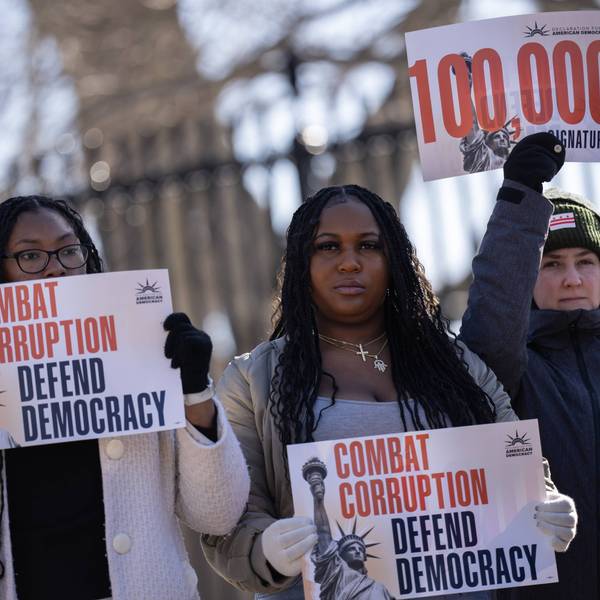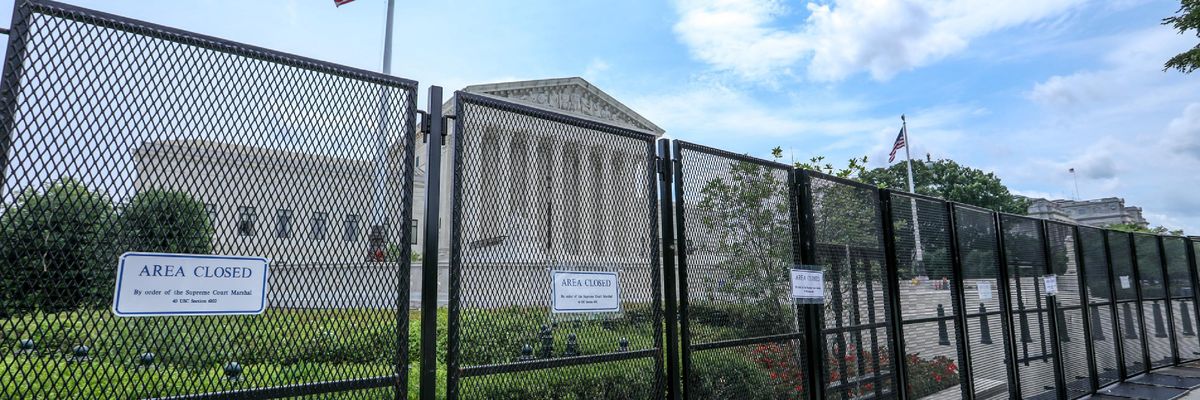Usurping the fundamental rights of women to control their own bodies.
Authorizing corporate giants to buy our elections.
Nullifying the right of organizers to talk to workers about unionizing.
Today's tightly knit Republican majority on the court did not come together by happenstance--and certainly not because any one of them was the brightest, most fair-minded choice in the land.
Who is rigging America's legal system against workaday people? The Supreme Court's right-wing extremists, that's who. Just a handful of aloof, unelected judges have been turning what's supposed to be a citadel of justice into an unrestrained political instrument for instituting autocratic, plutocratic, theocratic power over us. If that sounds like a coup, it is! A slow-motion power grab has quietly been underway for years, with a core group of corporate billionaires and far-right political operatives working (with practically no media exposure) to stack federal and state courts with partisan activists.
There's even a smoking gun revealing the origins of the plot. It's a confidential memo to the U.S. Chamber of Commerce, written in 1971 by Lewis Powell--at the time a rich corporate lawyer, consigliere for Big Tobacco and a Phillip Morris board member.
In his memo, Powell lamented that the likes of Ralph Nader were getting media coverage and legislative action by accusing upstanding corporate citizens (like cigarette makers) of profiteering from wrongdoings such as intentionally selling dangerous products. Powell wailed that poor little corporate America wasn't getting the respect it deserved from lawmakers, nor did it have its fair share of power over the nation's political system. You can practically hear Powell sobbing when he concludes that "with respect to the course of legislation and government action, the American business executive is truly the 'forgotten man.'"
Never mind that he made this absurd plea for pity at a time the presidency itself was infamously known as Nixon Incorporated, with a cadre of corporate functionaries literally running whole segments of the U.S. government! But absurdity was no barrier to Powell's grand ideological determination not only to increase the influence of those "forgotten" executives, but to return to pre-New Deal days when their ilk was the supreme, domineering force over America's government, economy and society. To get there, Powell's memo proposed a novel point of attack he labelled "Neglected Opportunity in the Courts."
He noted that "with an activist-minded Supreme Court, the judiciary may be the most important instrument for social, economic, and political change"--by which he meant structural changes that empower moneyed interests over workers, consumers, et al. Powell proceeds to specify judicial maneuvers for the Chamber and its big funders, conceding that the aggressive offensive "would require far more generous financial support from American corporations. ... But the opportunity merits the necessary effort."
Just two months after Powell sent his memo, Nixon awarded him a seat on the Supreme Court. Although few Americans have ever heard of him, Powell spent the next 15 years on the bench advancing corporate power over us, including writing a 1978 opinion that Roberts and Co. used 32 years later to justify their Citizens United decree.
But there's much more to this plutocratic attempt to capture the courts than one lawyer's how-to blueprint. After all, a memo is not a coup. Indeed, it has taken a concerted, surreptitious, two-decade campaign by a consortium of laissez-faire ideologues, dark-money billionaire funders, secretive front groups, top GOP politicos and many lies by Supreme Court nominees to "operationalize" Powell's memo.
Today's tightly knit Republican majority on the court did not come together by happenstance--and certainly not because any one of them was the brightest, most fair-minded choice in the land. All were hand-picked by the consortium and escorted to third-branch rule specifically because they could be counted on the use their lifetime appointments to make our laws accord with the GOP's right-wing agenda and to return to their imagined ideal of the grand old days of pre-1930s corporate supremacy. This is a direct special-interest assault on workaday Americans and on the very idea of America.
Lisa Graves, a corporate watchdog and advocate of fair courts, reminds us that "the choice of who interprets the U.S. Constitution and the laws of our land is every bit as important as electing those who make the laws in the first place." The moneyed elites figured this out years ago and have captured the top court. Now, democracy champions must free it from their corporate grip.
The Alliance for Justice was founded in the wake of the infamous Powell Memo urging corporate titans and the U.S. Chamber of Commerce "to weaponize the courts to serve business interests." AFJ is a national association of more than 120 organizations working to secure confirmation of "highly qualified, fair-minded, and diverse federal judges." afj.org




